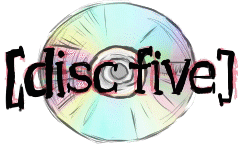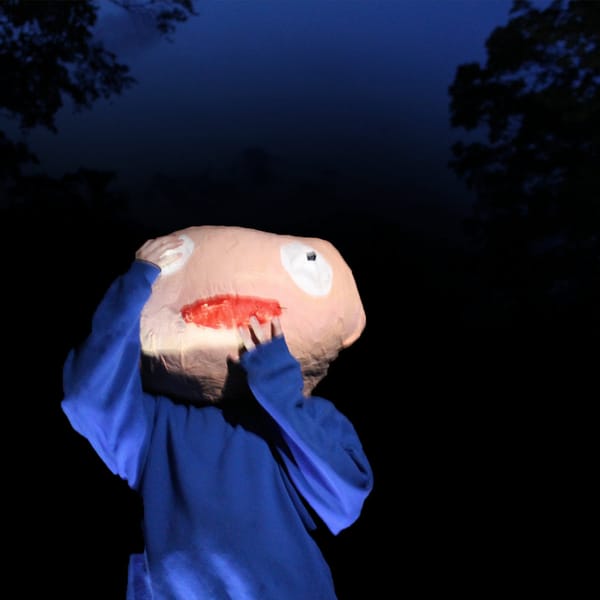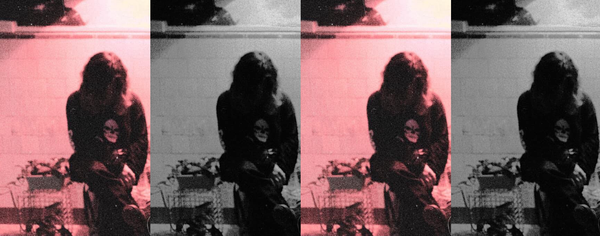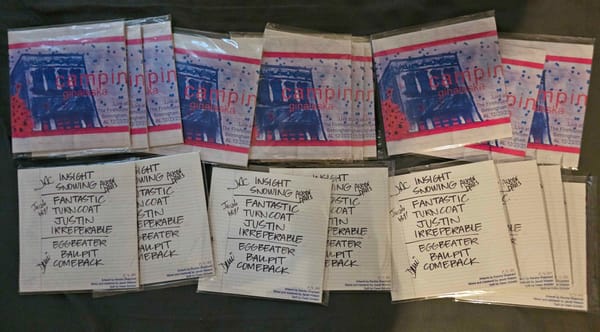Furry pop collective MIDI Bunny wants you to make messy art without fear
"We want people to go out and make art and not have to worry about what Twitter thinks about it." Biddy Fox and Cecily Renns talk about their emo furry musical, how it explores metafiction, and the ways it operates as an anti-confessional album.

[sounds like: furry pop // theatrical emo chiptune // toxic yuri //]
“This is not a record about real people.”
That’s the key thing to remember while listening to MIDI Bunny LP or, "Songs to Hurt Others." The album is about the fictional rabbit Cecily Cardew, the equally fictitious cat Beatrix Angelica, and the story that these characters write together.
But even within their storybook world, it’s hard to tell what’s “real” and what’s part of a character’s imagination. Sometimes Cecily (Renns) is performing as Cecily (Cardew), and other times it’s Biddy Fox singing Cardew’s verses. Similarly, sometimes Beatrix is played by Biddy Fox, and sometimes she’s played by InkyFirefly. Which voice is the character, and which voice is a character the characters have written? What’s the story, and what’s the story within the story? Whose fantasy is whose?
The real MIDI Bunny is a collective of friends making music together, with Biddy Fox and Cecily Renns operating at its core. The roster for the LP boasts A.J. Vega, InkyFirefly, Socks Riley Fox, and at least a dozen others contributing to the release. That communal aspect is key to the spirit of MIDI Bunny. “I feel like for a lot of us, we make music because we love hanging out with our friends,” Cecily tells me over Discord. She and Biddy Fox describe their ideal vision for MIDI Bunny as a multimedia project that platforms all their friends’ artworks. There’s a MIDI Bunny LP novel in the works right now, and select members recently played a show together at Anthrocon.
Together, the group has made a hugely ambitious LP, with behemoth tracks like “Cecily falls from the Sky Tower into HELL…” (12:48) and “Kill Your Darlings” (14:13). The album is eclectic - as emotionally frenzied as its main characters. Grungy shoegaze morphs into DDR dance beats, energetic chiptune dips into a dramatic saxophone solo, a rocksteady groove shifts into math rock...and when you think you’ve got the sound figured out, suddenly the story is invaded by a new character rapping about how all this confessional music doesn’t pay the bills.
Over Discord, Cecily and Biddy Fox chatted with me about the album’s themes, the pressures put on musicians to be “real,” and everyone’s right to make art.
This interview has been edited for length and clarity.
I like that on the album, you have a lot of different musicians playing the same characters. What was the thought process there?
BIDDY FOX: We were gonna have specific voice actors playing specific characters. If I remember right, I was going to play the character Cardew and we were going to have Inky play the character of Beatrix Angelica.
CECILY RENNS: Then in that song, “Falling down, part three,” we ended up getting more vocalists. I didn’t want to sing on that song, by the way, but [Biddy Fox] really liked my voice in that one part, so we decided, “Let’s just have it be combined, let’s just have everyone play the same two characters.” Making it confusing was, like, the point. We wanted you to not be able to understand to what extent is fiction and what's reality.
I love the spoken word parts, they’re cool.
BIDDY FOX: Thank you, they filter out the non-theater enjoyers.
CECILY RENNS: One thing that people don’t always get about [this album] is that every line of lyric is a line of dialogue from a character. When I read those spoken word parts, it’s not me saying that about this album. It’s the character that is talking about the fictional work of art that they’re making in this story.
BIDDY FOX: Yeah, there’s a song where [Cardew] says that aloud…
CECILY RENNS: …in a section about how they’re writing a story that’s not about them, and it’s an album that’s not about us. It’s a very meta moment for the album. I guess I get why people get confused by it, because it’s like, several layers deep.
I wanted to get more into that - specifically what you were exploring when it comes to outlining that art (and this album) is a part of you, but it is not you.
BIDDY FOX: I've experienced times when people have, like…when we say this is fiction, they almost felt betrayed because they wanted it to be real. People almost feel deceived if it's a piece of fiction.
CECILY RENNS: They want a personal, confessional, “genuine” album. This seems to be a unique problem in music. This phenomenon where musicians are demanded to be confessional and personal and, like, really bare their whole chest. People don't demand movie directors to put only their personal life into their stories like that. With this album, our goal was to do what other fiction artists like novelists and movie directors do with their works. Just create fiction. Like the monologue says, it has bits and pieces of our lives in it. We just didn't want to literally write about Cecily Renns and Biddy Fox.
BIDDY FOX: This also ties in with another theme of the album, which is that of a fictional story becoming real. That's pretty important because it both happens to the characters within the album and kind of happens to us. Like, “Lola” is an entire song about it.
There’s a line on “Cecily Falls From the Sky Tower…” where she says, “people say my art is good for being honest, but I don't want it to be.”And I wanted to know what was meant there. Like, why wouldn’t you want the music to be honest?
BIDDY FOX: Well, that’s not Cecily talking. That’s the character Cardew talking.
Oh, no, I meant what did Cecily mean by that? Well, not Cecily-Cecily but…this is hard to ask when you’re both named Cecily…
CECILY RENNS: That is me kind of channeling myself, saying that. It’s a bit of a frustration [for me], but as for Cardew…she's very, like, spiteful and destructive and she doesn't like anyone saying anything about her art because she's a fucking narcissist. And she also doesn't want anyone to interpret her art because that pisses her off. I want to make it clear that Cecily Cardew is kind of an asshole.
BIDDY FOX: The whole arc of that character is learning not to care what people think of your art.
CECILY RENNS: But for me personally, yeah, I do get a bit frustrated because a lot of people only assign value to my lyrics because of how “honest” they are. Whenever I wrote lyrics, people would say, “I love how honest it is. I love how real it is.” And it would never be about, like, the actual lyricism or metaphors.
BIDDY FOX: Yeah. Always feels like a backhanded compliment.
I feel like this came up on the EP as well?
CECILY RENNS: I actually quote a song from the MIDI Bunny EP in that monologue you’re talking about.
You kind of gave me the whole character outline for Cecily Cardew there. Now I want to hear your treatment outline of Beatrix Angelica.
CECILY RENNS: There's an album called UnPop that I made when I was 17. And there's a character called Anxie in it. It's short for anxiety.
BIDDY FOX: It's also short for Angelica!
CECILY RENNS: Anxie is the main character in UnPop, and this is not the same character, but she is in the “canon” of the stories. [Beatrix Angelica] named herself after this musician called Anxie, so it’s like how trans girls can name themselves after people they like. I thought that was a cute connection we could do.
CECILY RENNS: Cardew and Beatrix’s relationship is kind of based on what me and [Biddy Fox] were like in 2022. We weren’t doing very well, and we were kind of arguing every day. And to me, Beatrix is someone who thinks she knows everything and has the whole world figured out, but she's actually really emotionally immature. The song "The Collector's Unconscious" is like her theme song. It's about her having to learn how to be a person on her own. At the end of the song, her wish is that she doesn't want to die in the middle of nowhere, she really wants to make her mark on something. But her problem is this toxic relationship with Cardew. And by nature of Cardew being a fucking insane person, [Cardew] kind of becomes the "main character" of this album; she has insane main character syndrome. And Anxie kind of hates that, she wants to be her own person, which is why she breaks up with Cardew. She's like, "I don't want to have to live my life chained to your legacy." But we both have slightly different interpretations of these characters.
BIDDY FOX: When I write, I generally don’t like writing weird fucked up people as much as Cecily does…
CECILY RENNS: I do, I love it!
BIDDY FOX: The [upcoming MIDI Bunny LP novel] is co-written, and there are things I really like about the novel that are impossible to convey in an album because you don’t get as much inner monologue. Pivotal to Cardew's sense of the world is this idea that she is an alien, she finds it difficult to feel she belongs in any given group. Whereas contrastingly, Anxie is trying very hard to be a person, trying very hard to blend in and be a part of something. And she's terrified that people might figure out that she's actually not as intuitively grasping things like people around her are. So there ends up being this contrast between their prose. A lot of the time, Cardew explains things almost like an alien.
CECILY: Yeah, that's how I write, by the way, that's how I describe everything.
BIDDY FOX: Meanwhile, Anxie is very much more Dionysian and often describes things in her head, leaving out a lot of detail because she expects the reader to be able to figure out what she's talking about.
There’s a lot to think about with this story…like, there’s already a lot of replay value to this album, and now after talking to you I have like, ten new things to think about.
CECILY RENNS: We wanted this album to be almost like a puzzle that you have to solve.
Is there any element of the album that you think is super misunderstood, or any misconceptions that you want to clear up?
CECILY RENNS: The main thing we wanted to say with this album is at the end of first song - the part about art not being violence. That's the whole idea behind it, that people should be allowed to make art without backlash. There's so much discourse nowadays about what is the correct art to enjoy and what is the incorrect one you should hate or whatever. For us, this entire album is our way of saying, “none of that matters because art is something that is separate from your morality.” That's really the thing I want to say - art doesn't represent your morals or how good of a person you are.
BIDDY FOX: Art is outside of the spectrum of something being true or false.
CECILY RENNS: Yeah, and a lot of people want truth in art and they want morals from art. They want art to tell them that they're a good person. Let's make art about being a bad person! I think that's more fun, I like to channel that into my art. Why not make art about being a fucked up fucking autistic weirdo? MIDI Bunny LP is a huge ode to all the art in the world that probably would be crucified if it was a bit more popular. We want people to go out and make art and not have to worry about what Twitter thinks about it.
BIDDY FOX: I have another thing, which is that people always take this album really fucking seriously. People are always like, “oh, it's so dark and it's so real.” But there's a lot of sections where it's deliberately weird and funny and stupid. And I feel like people just kind of ignore it.
CECILY RENNS: There’s a line [on “Magical Girl(s)”] that goes, “don't look at Twitter, that shit’s mental suicide.” That's a funny ass line! That song is kind of serious and there's a really sad moment at the end, but the song is more of a funny song about how art is this really important thing…
BIDDY FOX: …but it's not that important…
CECILY RENNS: …being a person is more important.
BIDDY FOX: There's lots of very real stuff about being a teenager on the Internet that people related to even though I meant them to be funny. Like the line about “gay teen furries in autumnal bedrooms.” [The album] is supposed to be a dark comedy - not only a comedy, but a parody. It’s a parody of one specific album, and of the concept of writing a long, artsy opera about your breakup. It’s especially there early in Act One with [songs] like “Lola.”
CECILY RENNS: I like to call it, “an album about two people who made Twin Fantasy.”
BIDDY FOX: But yeah, a major thing that ties into the theme is that you can make an album about whatever you want to. Maybe you shouldn't, but you can.
CECILY RENNS: Yeah, that is the thesis statement. You should make art.
Support MIDI Bunny LP or, "Songs to Hurt Others." on Bandcamp! You can pick up the cassette from CUTE CERVID here.




